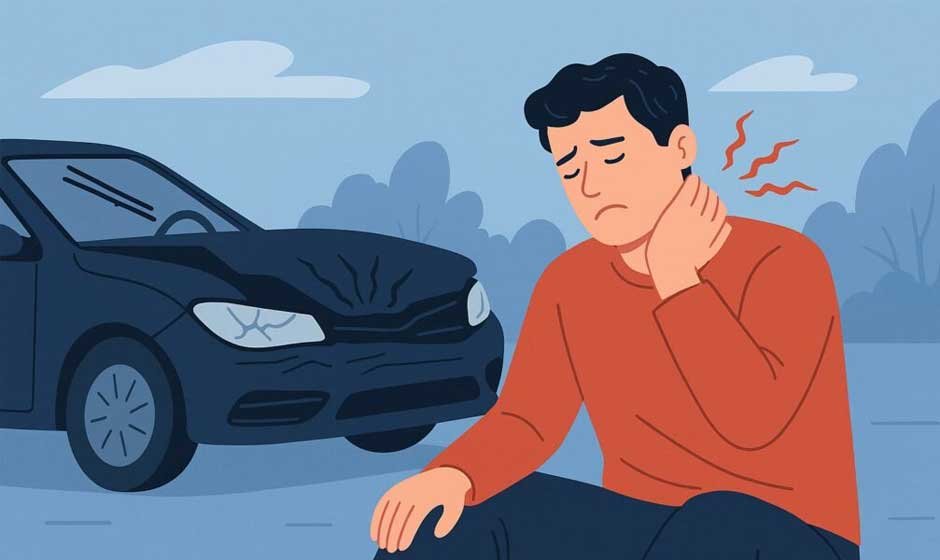Car accidents can be abrupt and horrific events that leave anyone involved feeling disoriented and disturbed. The aftermath of a collision can be significantly more complex than it first seems, even if it appears to be trivial. Ignoring discomfort that arises following an injury and thinking it would just go away with time is a common mistake. Acknowledging symptoms early on and getting appropriate medical treatment is crucial since some injuries cannot show up right away but get worse if not handled.
The Hidden Nature of Injuries
After a car accident, the body produces an adrenaline rush, which can temporarily mask pain and damage. This normal reaction can lead people to feel they are unharmed when, in reality, damage can have occurred. Ligament sprains, whiplash, and muscle strains are examples of soft tissue injuries that can cause pain or swelling for hours or days. Internal injuries, such as organ damage or hemorrhage, can sometimes result in gradual or delayed symptoms. Ignoring pain during this period can prevent a prompt diagnosis and treatment, resulting in chronic pain, lifelong disability, or other major medical issues. Early and immediate attention to any pain ensures that underlying injuries are not overlooked and that appropriate treatment is administered.
The Risk of Long-Term Complications
Pain following a car collision should never be dismissed as minor stiffness or discomfort. Untreated injuries can develop into chronic diseases seriously impairing quality of life. For months or even years, untreated whiplash can cause reduced movement, headaches, and ongoing neck pain. In the same vein, spinal injuries can go undetectable and raise nerve damage or paralysis risk. Ignoring pain can also result in compensation problems since treatment delays might compromise the medical data required for insurance or lawsuits. Early pain management not only promotes physical healing but also helps to maintain the right to just recompense for accident-related injuries.
Emotional and Psychological Impact
Pain following a car accident is typically more than just bodily; it can also be emotional and psychological. Together with continuous suffering, the trauma of the event can cause anxiety, sadness, and post-traumatic stress disorder (PTSD). Unmanaged pain can aggravate these disorders and set off a cycle whereby emotional stress aggravates physical symptoms and vice versa. Understanding pain as a major problem motivates one to seek assistance not only from medical professionals but also from mental health experts should be needed. Early intervention can stop the emergence of long-term psychological problems and advance complete healing.
Potential Impact on Daily Life and Work
Ignored pain after an injury can severely impede everyday functioning. Simple chores like walking, sitting, or lifting might become difficult and uncomfortable, which influences personal obligations and performance at the job. Often resulting from decreased productivity and extended absence from work, chronic pain can cause financial difficulty. Furthermore, complicating recuperation is the possibility that untreated pain will call for more costly and intrusive therapies down the road. Early identification and resolution of pain enables efficient treatment plans that can limit disturbance of daily life and restore function more rapidly.
Legal Considerations
Pain after a car accident is quite relevant in the legal context. It gives evidence of damage suitable for substantiating compensation claims. In circumstances involving complicated accidents, such as those involving commercial vehicles, consulting a legal specialist can be extremely critical. For example, victims of large truck accidents should consult with a California truck accident lawyer to learn about their rights and options. Ignoring discomfort or postponing medical treatment might undermine a case and result in reduced compensation. Legal advice and prompt medical treatment help to ensure that any legal proceedings appropriately record and account for injuries. Visit Slam Dunk Attorney in Duluth to get expert legal guidance and ensure your rights are protected following an accident.
Consulting a skilled car accident lawyer can also help you understand your legal options and secure the compensation you deserve.
Conclusion
Ignoring discomfort following an automobile accident can have major, long-lasting effects, both legally and physically. Often, the first and most crucial signal the body uses to indicate something is wrong is pain; ignoring it can result in chronic diseases, increasing injuries, and trouble getting compensation. Detecting concealed injuries and starting suitable treatment depends on immediate and comprehensive medical diagnosis, which also helps to speed recovery and lowers the risk of long-term consequences. Furthermore, safeguarding the rights and interests of the impacted parties is appropriate documentation and legal direction.













